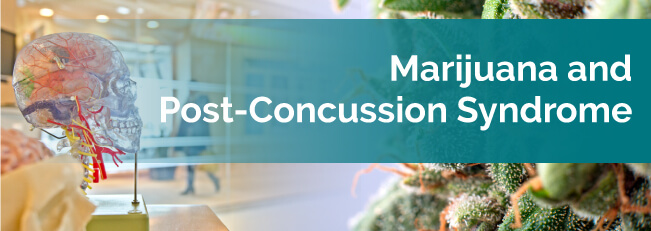
With approximately 715 emergency room visits due to traumatic head injury in 2010, the Center for Disease Control and Prevention reports a spike in the rates of concussions since 2001. In that timeframe, deaths from concussion were down slightly. Anywhere from 40 to 80% of people who sustain a concussion develop post-concussion syndrome.
Our understanding of post-concussion syndrome is still incomplete. The causes and risk factors can be isolated with medical data but not explained exactly. The condition often resolves on its own after exhibiting debilitating symptoms for weeks or months. Medical marijuana therapy during that time may be the single treatment that can relieve physical and psychological symptoms of post-concussion syndrome.
It may seem counter-intuitive to add a psychoactive drug to the brain of someone who is experiencing behavioral changes as a result of a brain injury. The most serious damage that can be caused by a concussion is the chemical damage to the brain. In this area, doctors are working with non-specific information and do not have tools to help the brain heal.
A recent study showed the potential effects of cannabis for post-concussion syndrome. Elements in the cannabis reduce swelling in the brain. Swelling causes pressure, damage and pain. A traumatic injury to the brain releases toxic chemicals that cause some of the symptoms of post-concussion syndrome. Marijuana can help clear those chemicals and protect the brain from further damage.
Marijuana also increases blood supply to the brain. This is helpful because the blood brings oxygen and nutrients to help speed healing. It also carries toxins and other byproducts away from the brain. Medical marijuana is also effective in treating anxiety and depression, two symptoms of post-concussion syndrome.
Marijuana may only be treating the symptoms of post-concussion syndrome, but it has few if any side effects and it is one medicine that can address most of the symptoms of this condition. There is very little clinical research so far on the use of medical marijuana for post-concussion syndrome, but it is effective for many of the symptoms.
Referring to medical marijuana, Dr. Jeffrey Hergenrather said that, “In my opinion, there is no better drug for the treatment of anxiety disorders, brain trauma and post-concussion syndrome.” Patients can use sativa-dominant strains to combat their emotional symptoms, depression, headaches and migraines.
Cannabis strains are classified by their two main ingredients, THC and CBD. Each has a different effect on the brain, and, when the two are balanced just right, they can relieve your specific combination of symptoms. When dealing with post-concussion syndrome, keep in mind that large doses of THC, the psychoactive ingredient in marijuana, can cause paranoia and hyper-activity.
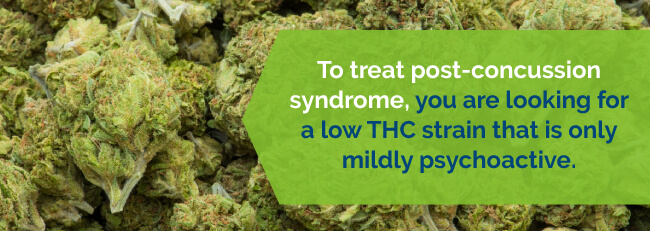
To treat post-concussion syndrome, you are looking for a low THC strain that is only mildly psychoactive. There should be just enough THC to reduce anxiety and bring about a sense of wellbeing without triggering paranoia. Consider one of these strains that is known to treat depression:
Pain relief is another property of medical marijuana that you’ll need to combat post-concussion syndrome. Headache pain following a concussion is often described as severe and similar to that of a migraine headache. These cannabis strains are the best for migraine headaches:
Sleep pattern disturbances or insomnia is another common symptom of post-concussion syndrome that can be treated with medical marijuana. Since anxiety can be one of the root causes of this type of insomnia, it is a good idea to go easy on the THC. Medical marijuana that is especially good for trauma-related insomnia has some CBD to balance the effects of THC. These strains are best known for treating insomnia:
Edible forms of medical cannabis deliver a slow but long-lasting affect. They are the best form of delivery for insomnia because they help you fall asleep and stay asleep for a restful several hours.
Although the symptoms of post-concussion syndrome are temporary, the inability to concentrate and a shortened attention span, along with a general fatigue, can make it impossible to carry out your daily responsibilities. Cannabis strains with a higher CBD to THC ratio can help you stay focused and increase your energy levels. Try these top stains for focus and energy:
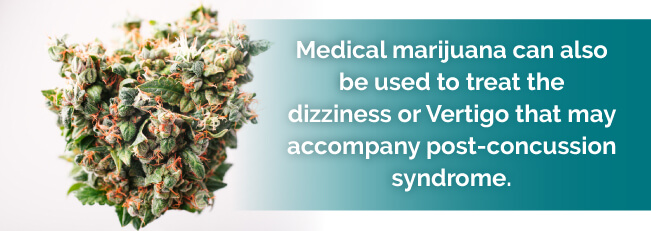
Medical marijuana can also be used to treat the dizziness or Vertigo that may accompany post-concussion syndrome. Marijuana is well known for its effectiveness in reducing nausea, especially related to strong chemotherapy courses. Nausea and dizziness often go together. Dizziness is reduced best by these strains of cannabis:
A qualified marijuana doctor can recommend the right strain of cannabis to treat your specific combination of symptoms from post-concussion syndrome. There are several ways to consume medical marijuana, so the products you use can also be tailored to your specific medical needs.
Medical marijuana has very few side effects and offers no risk of overdose. With guidance from your doctor, you should be able to remain relatively comfortable while your brain heals the damage caused by a concussion. A side effect of your marijuana treatments might be faster healing and protection of damaged nerves.
If you want to learn more about the medicinal value of cannabis products, sign up for our newsletter. It will keep you updated on medical cannabis research and the medical marijuana program in your state. Did you know many states already approve the use of medical marijuana for chronic pain and migraines? This means that if it is not specifically approved for use on post-concussion syndrome in your state, you may still be treated with marijuana products for your headaches.
While most states’ medical marijuana regulations include a list of approved conditions for treatment with cannabis, several of them also include a clause that allows doctors to make recommendations outside of that specific list if they feel they are medically warranted. Illinois is the first state to include post-concussion syndrome on its list of approved conditions for marijuana treatment. Other states will likely follow their lead.
If you do not have a marijuana doctor, you can find one who is approved in your state by using the search feature on our website. Marijuana Doctors can connect you with a doctor near you who is registered in your state to make medical marijuana treatment recommendations. We can help you become registered as a marijuana patient in your state and help you understand the regulations concerning the use of cannabis for medical purposes.
Compassionate care is available in most states, so people with severe pain or debilitating conditions do not have to suffer. Marijuana Doctors can connect you with the resources you need to access the comforting properties of medical cannabis, whether you are experiencing post-concussion syndrome or some other condition that does not respond to traditional medicinal therapies.
For more information about how cannabis can be used to treat Post-Concussion Syndrome, check out our resources:
Find A Doctor Find A Dispensary
Centuries ago, medical experts were aware that a solid blow to the head could result in cognitive dysfunction, loss of consciousness and a range of mental conditions. These conditions could be acute or become chronic. Although there was no means at the time to see inside the head, doctors were sure the brain could become disturbed by a head injury.
As medical science advanced, we came to understand the brain and central nervous system could be severely affected by trauma to the head. More recently, we learned it is not just the impact on the head that causes these reactions. The shaking motion can damage the brain inside the skull even though there is no injury visible through the skin.
Late in the 19th century, frequent train accidents demonstrated the whiplash style of head injury that results in a concussion. Even if the head does not strike an object, when it is propelled forward quickly and then stopped, the brain inside the skull sustains a concussion. At this time, long-term consequences of concussions became evident.
Simultaneously, sports doctors were concerned with the number of concussions sustained by football players. In 1906, a member of the Harvard Varsity team died from a head injury and drew attention to the severity of football injuries. A study at the time revealed 19 concussions in one season. Doctors noted that players might not be aware of sustaining a concussion during the play.
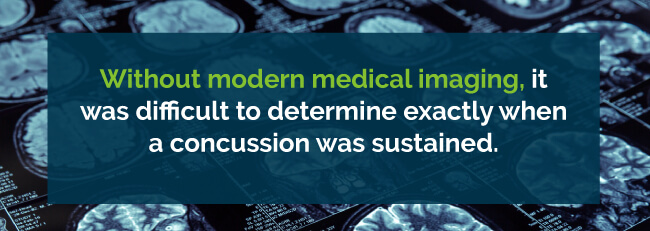
Without modern medical imaging, it was difficult to determine exactly when a concussion was sustained. If the injury did not result in a visible wound to the head, doctors could not detect the damage to the brain. It was almost impossible to correlate a concussion with subsequent behavioral changes.
Today, a CT scan and an MRI of your head can be used to diagnose a concussion. There may or may not be loss of consciousness with a concussion, but there will be evidence of at least a minor traumatic brain injury. Doctors can diagnose post-concussion syndrome based on a history of concussion and certain behavioral changes that often accompany the condition.
Post-concussion syndrome can last for days, weeks or months following a head injury. The symptoms can vary and may set in at any time. Following a concussion, symptoms of post-concussion syndrome can include:
Following a traumatic brain injury, the presence of at least three of these symptoms indicates post-concussion syndrome. You don’t have to lose consciousness from the initial concussion to be diagnosed with post-concussion syndrome. Oddly enough, the resulting condition does not appear to have a correlation with how severe the initial blow to head was.
Post-concussion syndrome may result from a seemingly minor head injury while someone sustaining a more severe injury might not develop the condition.
The severity of your concussion and the number of concussions sustained over time are not good indicators of post-concussion syndrome. People over 40 have a higher risk of developing the condition, and women are diagnosed with post-concussion syndrome at a higher rate than men.
There is a chance that people with pre-existing mental health conditions are more likely to develop post-concussion syndrome following a concussion. Some of the symptoms are similar to those of depression and anxiety. Experts note that women may be diagnosed with post-concussion syndrome more frequently than men because they are more likely to seek medical attention, especially for behavioral symptoms.
The full physiology of post-concussion syndrome is not yet known. It results from damage to the brain that causes swelling and bleeding. The inflammation applies pressure to the brain, which can cause headaches and other symptoms.
The shakeup of a concussion also causes changes in your brain chemistry that neuroscientists cannot yet pinpoint. Neurotransmitters, the chemical messengers of the brain, are significantly affected by a concussion, and this shake up results in the symptoms of post-concussion syndrome.
There is no way to heal the brain tissue that was injured. In fact, in some cases, the injured tissue cannot be reached. The treatment for post-concussion syndrome consists of relieving the symptoms so patients can be more comfortable while the brain heals itself naturally.
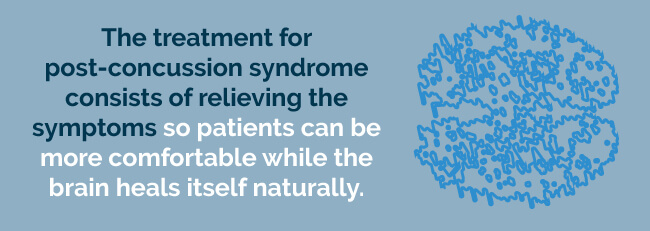
Headaches and other physical pain from post-concussion syndrome are usually treated with analgesics. This type of pain is sometimes compared to migraines or nerve pain, and it often requires strong pain relievers. Pain relievers, either prescription or over the counter, can worsen post-concussion headaches if over used.
Cognitive impairments brought on by post-concussion syndrome usually resolve themselves in time. These symptoms can be debilitating in the short term, however. Cognitive therapy can be used to learn memory support systems to compensate. Taking notes and using electronic reminders can be helpful to balance loss of memory and short attention span.
The emotional symptoms of post-concussion syndrome may be the most significant. Although these, too, should resolve in time, anxiety and depression can become life-threatening when left untreated. There are some behavioral and drug therapies available to relieve anxiety and depression. Some may also assist with insomnia.
Brain healing is not something doctors have all the specifics on. In most cases, post-concussion syndrome resolves within three months of onset. But, in some cases, the condition lasts for up to a year or longer. There is little that can be done to predict or alter the timeframe for post-concussion syndrome.
Although there is no one treatment specifically designed for post-concussion syndrome, healthcare professionals will often prescribe pharmaceuticals to combat the emotional symptoms which may occur. Additionally, physical and behavioral therapies can be utilized for patients on the road to recovery.